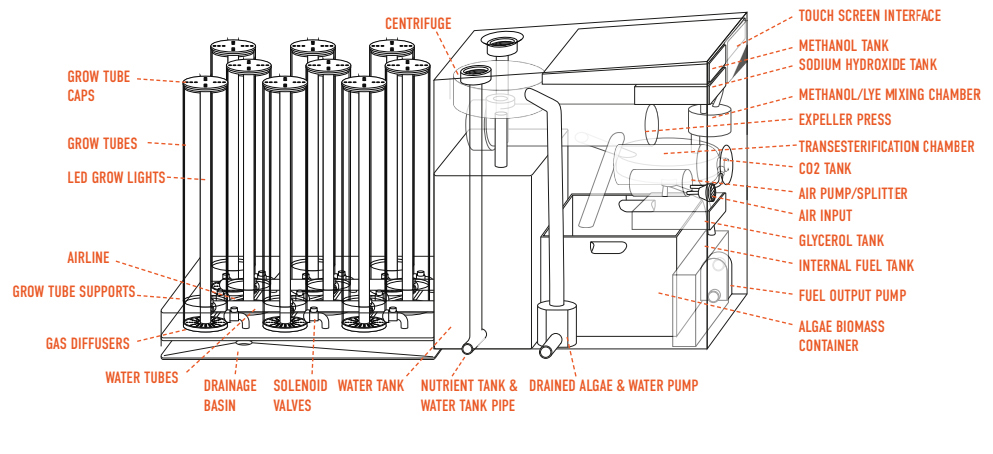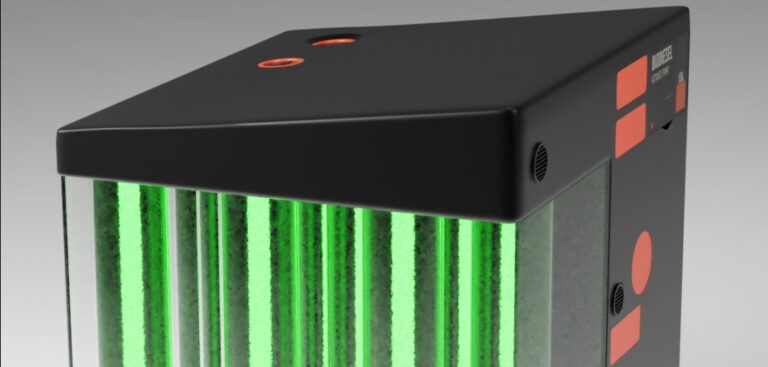Diesel is most certainly out of favor with both consumers and regulators, after several years of bad press and stringent legislation. However, there is a strong argument that it should be part of any sustainable future transportation system, especially if sourced as a biofuel.
Pushing this case is recent Brunel University industrial design graduate Charlie Wilson, who developed LumoFuel, a washing machine size household ‘bioreactor’ which uses algae to turn CO2 and sunlight into a usable diesel that promises to not only work in existing cars, but also be carbon-negative.
“Algae has been experimented with for over 20 years as a way to produce biofuels and power,” said Wilson. “The biggest hang up though has been scaling it up – you’d have really good low-scale, high-yield laboratory experiments, but the moment you try commercializing it, growing algae in big waterways, you’d end up needing to put more energy in than you get out. It becomes like a perpetual motion machine.”
Wilson’s solution is not to scale things up, but to scale them down. His system will use a species of quick-growing algae called Nannochloropsis Oculata that photosynthesizes CO2 and light into oxygen and energy, which the algae stores as fats – or lipids, to use the technical term. The device works in day-long cycles, harvesting and processing half of its colony of algae in the system, with the remainder then taking approximately 24 hours to double its biomass back to full density, ready for the next cycle.
The algae is harvested using an internal centrifuge, which separates it from the fluid it’s grown in before the energy dense lipids are extracted from the cells and combined with methanol and sodium hydroxide – an alcohol and a catalyst – to produce a biodiesel that can be pumped directly into an unaltered diesel vehicle, or used for applications like heating and cooking.
“By decentralizing production and moving it into the home, we cut out everything from the oil rig to the petrol station, because we’re just producing our own fuel with the only input being sunlight, captured using solar panels, a few bottles of very cheap chemicals, and CO2 ,” said Wilson, who is launching the concept online as part of Brunel’s annual showcase, Made in Brunel, which will form part of this year’s London Design Festival.
“The only by-products will be the unused biomass of the algae, glycerol and oxygen. These can be all by recycled into a wide range of products – from food supplements and fertilizers, to bioplastics,” he added.
Rather than take the CO2 directly from the atmosphere, LumoFuel will use gases collected from industrial flues – a technique already commonly used by the soft drinks industry. “So, rather than put the CO2 into a fizzy drink – which then escapes again when you open the can – we’ll take it and convert it into pure oxygen using algae,” he said.
According to Wilson, using just 4kWh of power per day and small amounts of methanol and sodium hydroxide, LumoFuel should, theoretically at least, be able to produce 3 liters of fuel per day – slightly more than the average UK family uses – for as little as £0.14 (US$0.18).
However, the design is still in the early concept stages. “While the science and design are sound in theory, I’ve not actually been able to test the product yet beyond cultivating some algae, adding the chemicals that would be needed inside the product and then lighting it on fire. There’s a lot of physical testing still needed,” conceded Wilson.
“Ideally, the next step will be to develop a physical prototype and pass it on to end-users for feedback, before securing funding for a fully-working prototype.”
Wilson was unable to build a working prototype of the device as part of his degree due to coronavirus restrictions.



